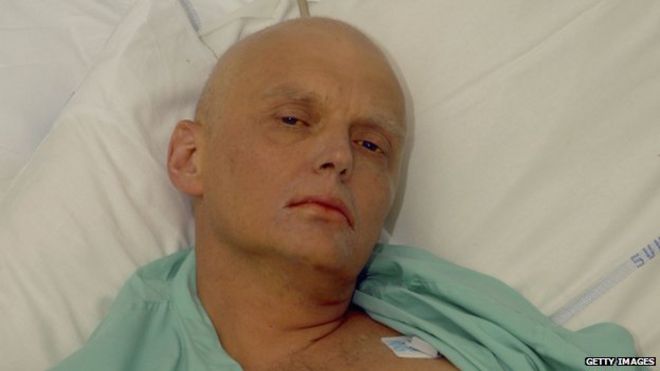Capital Punishment, Putin-Style
"It all went so fast. In the space of about twenty minutes, I went from feeling completely normal to having a rapid heart rate, really high blood pressure, to sweating and vomiting all over the place, and then I lost consciousness."
Vladimir Kara-Murza, Russian opposition leader
"The government is using the special services to liquidate its enemies. It was not just Litvinenko, but many others we don't know about, classified as accidents or maybe semi-accidents."Russians tend to be extremely courageous in continuing to offend their president, Vladimir V. Putin, by challenging his authority. Mr. Putin is not someone who takes such instances of obvious disrespect lightly, and it seems he is not a forgiving man. Too many journalists and political opponents have paid the supreme price of death for their belief that they could reasonably survive criticizing Mr. Putin. The amazing thing is, they continue to express their opinions, in defiance of his reputation and his penchant for instructing death squads to pursue his brand of justice.
Gennadi V. Gudkov, former member of Parliament, former lieutenant colonel, K.G.B.
"All of this sounds like paranoid conspiracy theories. But there are too many of these happening to important people. Captains of industry and lawyers are not dying left, right and centre like this in the West."
William F. Browder, American financier, anti-Russian government campaigner
Mr. Putin is, if nothing else, a man of supreme confidence in himself and contempt for those incapable of envisioning him as a man who has dedicated his life to Greater Russia, greater and greater Russia, through oppression and purloining of other neighbours' borders if need be, but a task to which he has dedicated himself with tremendous zeal. Mr. Kara-Murza had visited Washington to take part in public meetings to persuade American lawmakers to make full use of the Magnitsky Act, to hasten political change in Moscow.
The Magnitsky Act was adopted in the United States through the lobbying of American financier William Browder, target of tax fraud when he worked in Russia and who employed Mr. Magnitsky as his lawyer, recognizing his role as an anti-corruption crusader in Russia, hated by the authorities. Mr. Magnitsky had been arrested on trumped-up charges, imprisoned and died there when medical care was refused and his health deteriorated morbidly.
Once back in Russia, Mr. Kara-Murza, during a meeting with associates was the subject to a poisoning attempt, and lived to tell the tale. After emerging from a week-long coma, it was clear a security service had extended its use of capital punishment which, in this instance, failed. Political murder is a commonplace in this Russia; it worked during the Stalin era, and it works now. Journalists who think they can write about massive state corruption, rights advocates, opposition politicians, whistle-blowers and others who seek to change government are all targets of this very special backlash.
The whistle-blower that brought the attention of the world to Russia's sports doping scandal, Grigory Rodchenkov, well understands that to return to Russia is to agree to his own penalty meted out by government secret security, so he has decided to save his life and live elsewhere, though there are no guarantees, since that same secret security detail is quite capable of, and has proceeded to murder Russians abroad, with impunity.
 |
| Alexander Litvinenko fell ill after a meeting with former KGB contacts in London in 2006 |
The most infamous of its foreign ventures was the polonium poisoning of Alexander V. Litvinenko, an opponent of Putin who didn't live to tell the story. The world saw photos and news stories of Mr. Litvinenko's suffering in a hospital bed in London as he agonizingly suffered the deadly effects of polonium destroying his body internally until death finally gave him release from his agony. His death too serves as a warning to other critics of Russian government.
Yulia Stepanova, a Russian runner, is now in hiding in the United States with her husband, both of whom were forced to flee Russia in fear. "If something happens to us, then you should know that it is not an accident", she recently stated, of her involvement in revealing to the world the extent of the Russian government doping scheme at the Olympics. A coroner recently ruled that Kremlin insider Mikhail Y. Lesin died of blunt-force trauma in a Washington hotel room, not a heart attack as was originally stressed.
An intelligence officer who was accused of defecting and in the process betraying a ring of Russian spies working undetected undercover in American suburbs died in the United States. Aleksandr Poteyev, 65, was a former Russian intelligence officer whom the Russian Interfax news agency reported dead, due payback for revealing damaging information for Moscow and certainly for the undercover agents who had little option but to return to Russia, their identities revealed.
Russian banker Alexander Perepilichny in 2009 passed on records to Swiss investigators and in 2012, aged 44 in excellent health, suffered a heat attack, while jogging. In 2014, a botanist identified the cause of his death; not a heart attack. His stomach revealed traces of geisemium, a poisonous plant from the Himalayas, known to have been used in China for assassinations.
"How can you protect yourself? What can you do? Not eat? Bring your own lunch everywhere? How can you predict a poisoning?", asks Mr. Kara-Murza's wife Yevgenia, rhetorically, beside herself with concern and frustration over her husband's prospects for reasonable longevity.
Labels: Assassination, Politics, Russia, Threats


<< Home